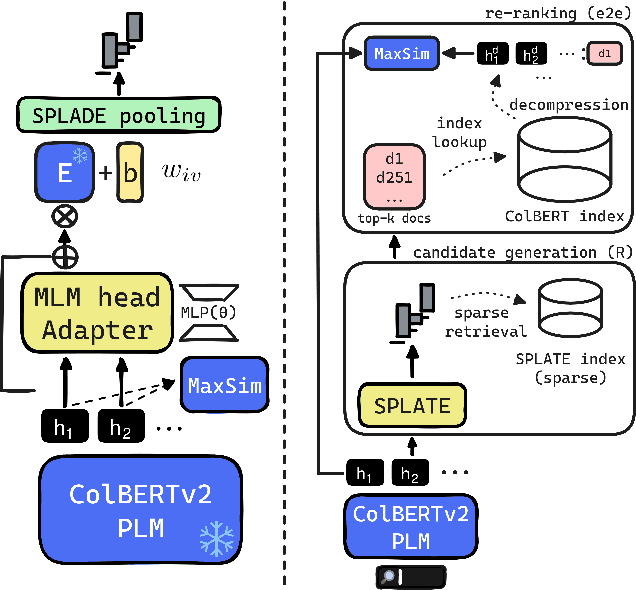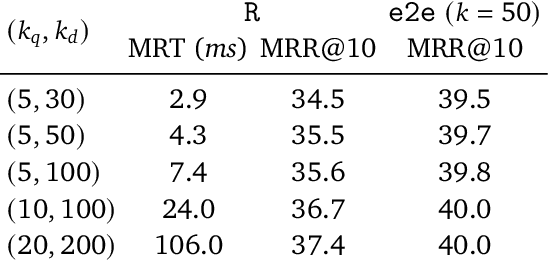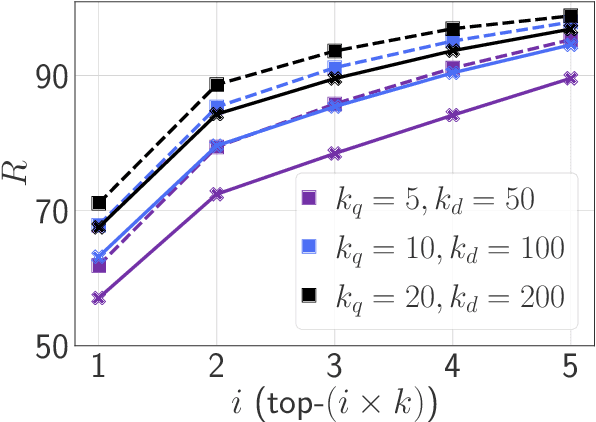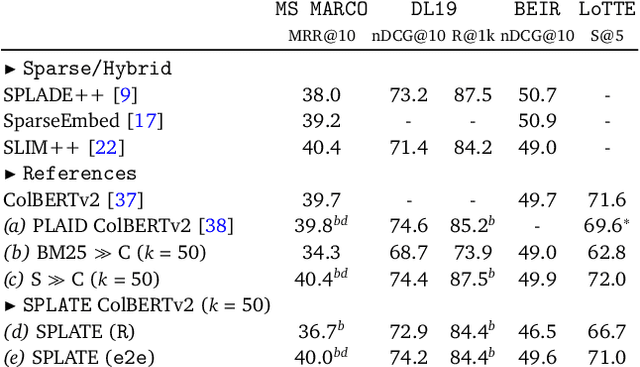Stéphane Clinchant
Reranking with Compressed Document Representation
May 21, 2025Abstract:Reranking, the process of refining the output of a first-stage retriever, is often considered computationally expensive, especially with Large Language Models. Borrowing from recent advances in document compression for RAG, we reduce the input size by compressing documents into fixed-size embedding representations. We then teach a reranker to use compressed inputs by distillation. Although based on a billion-size model, our trained reranker using this compressed input can challenge smaller rerankers in terms of both effectiveness and efficiency, especially for long documents. Given that text compressors are still in their early development stages, we view this approach as promising.
RANa: Retrieval-Augmented Navigation
Apr 04, 2025Abstract:Methods for navigation based on large-scale learning typically treat each episode as a new problem, where the agent is spawned with a clean memory in an unknown environment. While these generalization capabilities to an unknown environment are extremely important, we claim that, in a realistic setting, an agent should have the capacity of exploiting information collected during earlier robot operations. We address this by introducing a new retrieval-augmented agent, trained with RL, capable of querying a database collected from previous episodes in the same environment and learning how to integrate this additional context information. We introduce a unique agent architecture for the general navigation task, evaluated on ObjectNav, ImageNav and Instance-ImageNav. Our retrieval and context encoding methods are data-driven and heavily employ vision foundation models (FM) for both semantic and geometric understanding. We propose new benchmarks for these settings and we show that retrieval allows zero-shot transfer across tasks and environments while significantly improving performance.
PISCO: Pretty Simple Compression for Retrieval-Augmented Generation
Jan 27, 2025Abstract:Retrieval-Augmented Generation (RAG) pipelines enhance Large Language Models (LLMs) by retrieving relevant documents, but they face scalability issues due to high inference costs and limited context size. Document compression is a practical solution, but current soft compression methods suffer from accuracy losses and require extensive pretraining. In this paper, we introduce PISCO, a novel method that achieves a 16x compression rate with minimal accuracy loss (0-3%) across diverse RAG-based question-answering (QA) tasks. Unlike existing approaches, PISCO requires no pretraining or annotated data, relying solely on sequence-level knowledge distillation from document-based questions. With the ability to fine-tune a 7-10B LLM in 48 hours on a single A100 GPU, PISCO offers a highly efficient and scalable solution. We present comprehensive experiments showing that PISCO outperforms existing compression models by 8% in accuracy.
Provence: efficient and robust context pruning for retrieval-augmented generation
Jan 27, 2025



Abstract:Retrieval-augmented generation improves various aspects of large language models (LLMs) generation, but suffers from computational overhead caused by long contexts as well as the propagation of irrelevant retrieved information into generated responses. Context pruning deals with both aspects, by removing irrelevant parts of retrieved contexts before LLM generation. Existing context pruning approaches are however limited, and do not provide a universal model that would be both efficient and robust in a wide range of scenarios, e.g., when contexts contain a variable amount of relevant information or vary in length, or when evaluated on various domains. In this work, we close this gap and introduce Provence (Pruning and Reranking Of retrieVEd relevaNt ContExts), an efficient and robust context pruner for Question Answering, which dynamically detects the needed amount of pruning for a given context and can be used out-of-the-box for various domains. The three key ingredients of Provence are formulating the context pruning task as sequence labeling, unifying context pruning capabilities with context reranking, and training on diverse data. Our experimental results show that Provence enables context pruning with negligible to no drop in performance, in various domains and settings, at almost no cost in a standard RAG pipeline. We also conduct a deeper analysis alongside various ablations to provide insights into training context pruners for future work.
Context Embeddings for Efficient Answer Generation in RAG
Jul 12, 2024Abstract:Retrieval-Augmented Generation (RAG) allows overcoming the limited knowledge of LLMs by extending the input with external information. As a consequence, the contextual inputs to the model become much longer which slows down decoding time directly translating to the time a user has to wait for an answer. We address this challenge by presenting COCOM, an effective context compression method, reducing long contexts to only a handful of Context Embeddings speeding up the generation time by a large margin. Our method allows for different compression rates trading off decoding time for answer quality. Compared to earlier methods, COCOM allows for handling multiple contexts more effectively, significantly reducing decoding time for long inputs. Our method demonstrates a speed-up of up to 5.69 $\times$ while achieving higher performance compared to existing efficient context compression methods.
Retrieval-augmented generation in multilingual settings
Jul 01, 2024



Abstract:Retrieval-augmented generation (RAG) has recently emerged as a promising solution for incorporating up-to-date or domain-specific knowledge into large language models (LLMs) and improving LLM factuality, but is predominantly studied in English-only settings. In this work, we consider RAG in the multilingual setting (mRAG), i.e. with user queries and the datastore in 13 languages, and investigate which components and with which adjustments are needed to build a well-performing mRAG pipeline, that can be used as a strong baseline in future works. Our findings highlight that despite the availability of high-quality off-the-shelf multilingual retrievers and generators, task-specific prompt engineering is needed to enable generation in user languages. Moreover, current evaluation metrics need adjustments for multilingual setting, to account for variations in spelling named entities. The main limitations to be addressed in future works include frequent code-switching in non-Latin alphabet languages, occasional fluency errors, wrong reading of the provided documents, or irrelevant retrieval. We release the code for the resulting mRAG baseline pipeline at https://github.com/naver/bergen.
BERGEN: A Benchmarking Library for Retrieval-Augmented Generation
Jul 01, 2024



Abstract:Retrieval-Augmented Generation allows to enhance Large Language Models with external knowledge. In response to the recent popularity of generative LLMs, many RAG approaches have been proposed, which involve an intricate number of different configurations such as evaluation datasets, collections, metrics, retrievers, and LLMs. Inconsistent benchmarking poses a major challenge in comparing approaches and understanding the impact of each component in the pipeline. In this work, we study best practices that lay the groundwork for a systematic evaluation of RAG and present BERGEN, an end-to-end library for reproducible research standardizing RAG experiments. In an extensive study focusing on QA, we benchmark different state-of-the-art retrievers, rerankers, and LLMs. Additionally, we analyze existing RAG metrics and datasets. Our open-source library BERGEN is available under \url{https://github.com/naver/bergen}.
SPLATE: Sparse Late Interaction Retrieval
Apr 22, 2024



Abstract:The late interaction paradigm introduced with ColBERT stands out in the neural Information Retrieval space, offering a compelling effectiveness-efficiency trade-off across many benchmarks. Efficient late interaction retrieval is based on an optimized multi-step strategy, where an approximate search first identifies a set of candidate documents to re-rank exactly. In this work, we introduce SPLATE, a simple and lightweight adaptation of the ColBERTv2 model which learns an ``MLM adapter'', mapping its frozen token embeddings to a sparse vocabulary space with a partially learned SPLADE module. This allows us to perform the candidate generation step in late interaction pipelines with traditional sparse retrieval techniques, making it particularly appealing for running ColBERT in CPU environments. Our SPLATE ColBERTv2 pipeline achieves the same effectiveness as the PLAID ColBERTv2 engine by re-ranking 50 documents that can be retrieved under 10ms.
Two-Step SPLADE: Simple, Efficient and Effective Approximation of SPLADE
Apr 20, 2024Abstract:Learned sparse models such as SPLADE have successfully shown how to incorporate the benefits of state-of-the-art neural information retrieval models into the classical inverted index data structure. Despite their improvements in effectiveness, learned sparse models are not as efficient as classical sparse model such as BM25. The problem has been investigated and addressed by recently developed strategies, such as guided traversal query processing and static pruning, with different degrees of success on in-domain and out-of-domain datasets. In this work, we propose a new query processing strategy for SPLADE based on a two-step cascade. The first step uses a pruned and reweighted version of the SPLADE sparse vectors, and the second step uses the original SPLADE vectors to re-score a sample of documents retrieved in the first stage. Our extensive experiments, performed on 30 different in-domain and out-of-domain datasets, show that our proposed strategy is able to improve mean and tail response times over the original single-stage SPLADE processing by up to $30\times$ and $40\times$, respectively, for in-domain datasets, and by 12x to 25x, for mean response on out-of-domain datasets, while not incurring in statistical significant difference in 60\% of datasets.
A Thorough Comparison of Cross-Encoders and LLMs for Reranking SPLADE
Mar 15, 2024Abstract:We present a comparative study between cross-encoder and LLMs rerankers in the context of re-ranking effective SPLADE retrievers. We conduct a large evaluation on TREC Deep Learning datasets and out-of-domain datasets such as BEIR and LoTTE. In the first set of experiments, we show how cross-encoder rerankers are hard to distinguish when it comes to re-rerank SPLADE on MS MARCO. Observations shift in the out-of-domain scenario, where both the type of model and the number of documents to re-rank have an impact on effectiveness. Then, we focus on listwise rerankers based on Large Language Models -- especially GPT-4. While GPT-4 demonstrates impressive (zero-shot) performance, we show that traditional cross-encoders remain very competitive. Overall, our findings aim to to provide a more nuanced perspective on the recent excitement surrounding LLM-based re-rankers -- by positioning them as another factor to consider in balancing effectiveness and efficiency in search systems.
 Add to Chrome
Add to Chrome Add to Firefox
Add to Firefox Add to Edge
Add to Edge